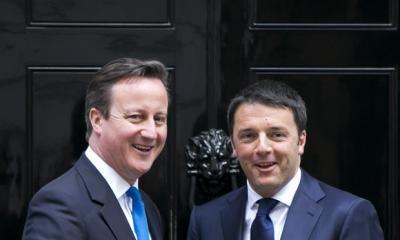Brexit impact on Italy

ROME -- Italian Prime Minister Matteo Renzi called an emergency meeting at Palazzo Chigi on Friday morning to examine the impact of Brexit, which was voted for yesterday at 51.9 percent to 48.1 with a turnout of 72.2 percent of UK voters, on Italy. The minister for foreign affairs Paolo Gentiloni, of the Economy Pier Carlo Padoan, of Economic Development Carlo Calenda, the head of the Italian National Bank Ignazio Visco, and the Prime Minister’s undersecretary and delegate for the secret service Marco Minniti were also present.
Romano Prodi has said that from the outcome of Europe and the Italian governement’s meeting he “expects assurances and commitments to action, even outside the European rules laid down by an emergency situation.”
At the end of the summit, however, Renzi, who also spoke to French President Francois Hollande and German Chancellor Angela Merkel this morning, tweeted, “We have to change it to make it more human and more just. But Europe is our home, it’s our future.”
It is a view shared by Gentiloni who said, “This vote is a wake up call for Europe, an opportunity to relaunch a common policy for growth, defence, and immigration. Italy believes in that.”
Whilst the Italian government is pushing against the possible effects of the United Kingdom leaving the European Union, their politicians are divided on the British vote. A exuberant Matteo Salvini, leader of the Lega Nord party wrote, “Hurrah for the courage of the free citizens of Great Britain!!! The heart, head, and pride have beaten lies, threats, and blackmail. Thank you UK, now Europe will change at last, now it’s our turn.”
The Lega Nord Veneto region governor Luca Zaia went even further in his predictions saying, “the referendum contagion will be the mood in all countries, Italy included.” Fratelli d’Italia leader Giorgia Meloni shared the same sentiments: “Now we want democracy to return to Europe, that it’s always the people who choose on these issues and that the European institutions are returned to the people and removed from the ownership of business committees.”
On the side of those who hoped a different outcome now it is to think about what will come next, to re-launch the process of European unification, and the risks that are seen on the horizon. "Italy is not weak and is not at risk in the short term, at least in Europe the umbrella of the ECB will operate. The problem is the political response in the short term," said Democratic Party Chairman of the Budget Committee Francesco Boccia.
Everyone, meanwhile, is calling for a change in policies and practices of the Union. This attitude is summed up in an appeal by Former President of the Republic, Giorgio Napolitano, who launched a "call for all social and political forces and people of responsibility to rethink their attitudes.”
With Scotland and Northern Ireland also being overwhelmingly ‘Remain’ and David Cameron's resignation as announced on Friday morning this will undoubtedly be a time of great political change and uncertainty.
ch


